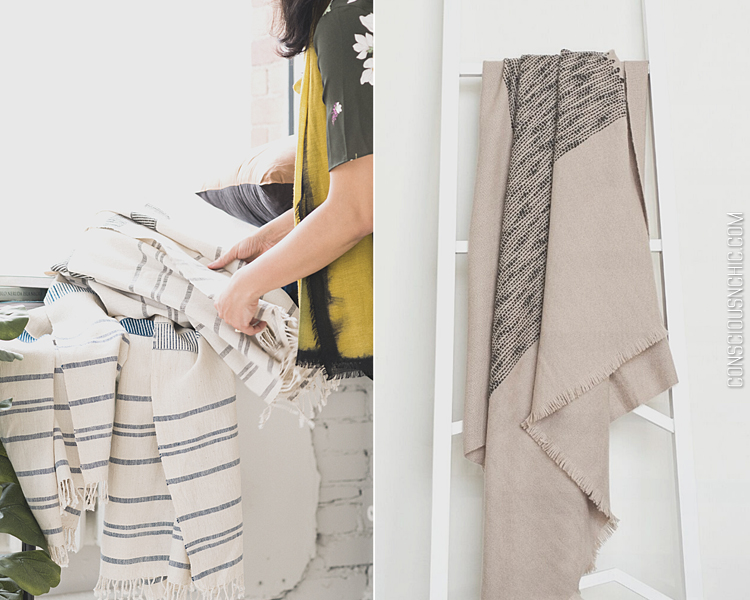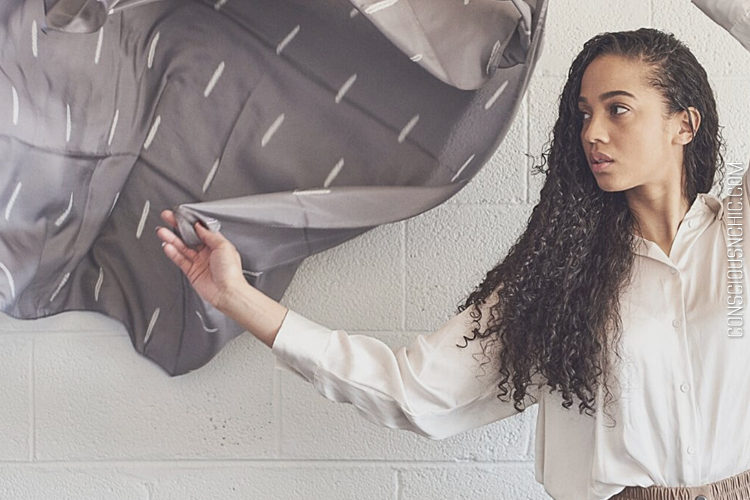We speak to Anjali, founder of sustainable textile brand Variously, to learn more.
At The Soko Edit we encourage people to support and shop female founders, because research shows women are more likely to place social responsibility at the heart of their business.
To inspire more women to create positive change through business, we asked Anjali, one of the entrepreneurs in our international community, about how her brand inspires her to create change, as well as the challenges and rewards of meeting the UN’s sustainability goals.
Anjali, tell us about your brand, Variously.
The market is flooded with cookie-cutter products, mass-produced to offer a standardized experience. When it comes to textiles, I saw an opportunity to create unique products such as scarves and throws by combining human-centric characteristics in the way the textile is conceived from idea to product stage.
Hand-crafted techniques that are set in cultural roots, inherently have a story to tell and connect to. It involves people have been handed down these unique skills and techniques that are not replicable and require a lot of expertise and understanding of materials and aesthetics.
What impact has this had on your business?
Choosing to stick with only hand-crafted techniques was a conscious decision, which also comes with limitations and risks. As each piece is made completely by hand, it involves more time, more cost and more quality checks at every step. Choosing only designs that can be made in small batches is important to ensure the economic viability of the idea. I have personally travelled to all my artisan locations in India and Nepal. The amount of time, energy, money that is invested during these trips is all personal, with my family also accompanying me. Though on-site visits help in authenticating the process and people involved, it’s also important to keep a check on their health and personal safety.
How has your business helped to support the local artisans?
Through my experiences I have learnt how important it is to enable economic stability to the artisan’s family involved, especially the women. Women are involved at various stages in our textiles like spinning yarn, dyeing, quality check, warping and handweaving. As a female business owner and a working mother myself, I know how important this can be for your well-being and overall quality of life.

We’re really inspired by your commitment to bring about change in fashion and design. We’ve heard it all started back in Gujarat?
In January 2001 my home state of Gujarat in India was impacted by a massive earthquake. I was pursuing my design education at National Institute of Fashion Technology, New Delhi at that time. UNDP (United Nations Development Project) collaborated with our design school to rehabilitate artisans severely impacted by the earthquake and this involved placing us design students in the villages for 2 to 3 months. This was a first-hand experience that came in early for me, where I learnt about different sets of challenges and opportunities in artisan-based products. For that project, I was involved with pottery and worked with a wonderful set of potters and their families. It was an extremely memorable experience which later also stayed with me and helped me reshape my focus on creating an artisan-based supply chain for Variously.
With Variously, you ensured your business meets the UN’s Sustainable Design Goals. Was that challenging?
The current market for fashion or lifestyle products is heavily deal and price-centric. Sustainable artisan-made textiles come with a certain price point, and that too for a reason. As a small business, to ensure we meet the UN’s Sustainable Design Goals is challenging as everything is again cost, time and quality driven. It’s not just about quality in the products you make but also quality of life for the people who are involved in the production process. To pay ethical living wages, to ensure use of safe materials, for example no use of toxic dyes or chemicals and hazardous materials during the manufacturing process and using authentic certified natural yarns and eco-friendly dyes is key to meeting these design goals.
So it impacts every aspect of your production process?
Yes, we also use locally cultivated, rain-fed 100% organic cotton in some of our handloom throws. Small local farms are involved in this and they collaborate with the artisans for supply and hand spinning of cotton yarn. Similarly, for another set of scarves we are using Eco Swiss Dyes, which are specially engineered to ensure eco-friendly ways of dyeing, by being free of toxic chemicals, using a lesser percentage of water during production. These are small but sure ways of incorporating sustainability in our process, which I feel is the future of design and fashion as well.
How can people find out more about your production process?
We created two short documentaries, Resa Thread and Confluence, to educate and raise awareness of the amount of work that is involved to create each piece on a handloom. Visuals create instant connect and understanding of the artisans who are involved and what it takes to bring each piece to life. Handcrafted techniques such as handloom are a very time- and skill-intensive process. Documentaries have been our way of creating a small but memorable impact on sharing the experience behind the making of our textiles.
Thank you Anjali, both for chatting to us today and accepting the challenges that come with creating a sustainable business. You can browse Anjali’s products, as well as other sustainably produced pieces at www.thesokoedit.com or via our Instagram.


